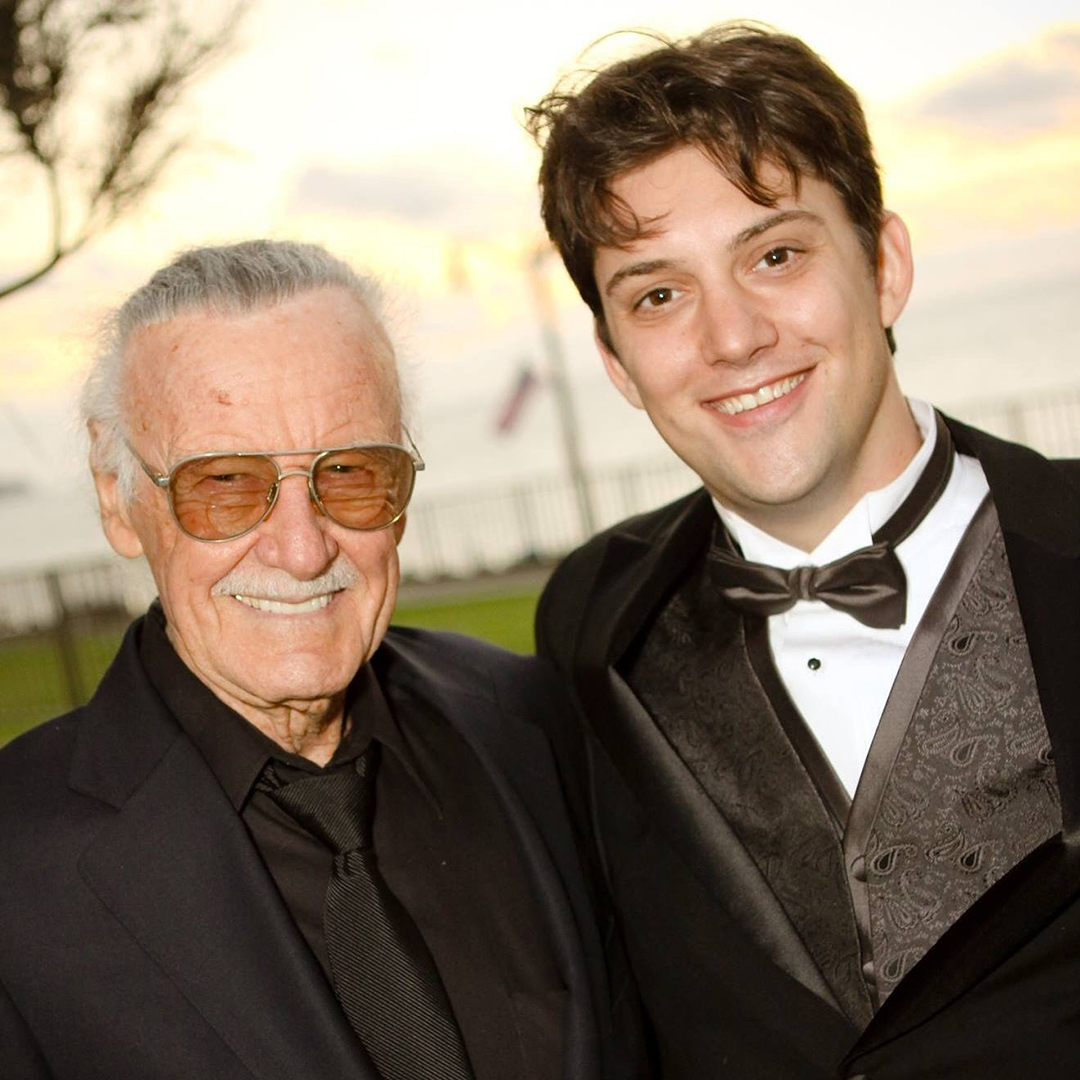Alum Draws on Superhero Legal Education to Bring Comics to Life

When Luke Lieberman ’12 was a relatively new lawyer with Beverly Hills entertainment firm Rosenfeld, Meyer & Susman, the LMU Loyola Law School graduate would sometimes stroll down the street to spend his lunch hour hanging out with comic book legend Stan Lee.
They would chat about issues that intrigued Lee, such as why the internet’s original promise of free-flowing ideas had turned so dark and whether the world we create or the world we are born in is more real.
Eventually, the two began imagining an alternate reality of their own, a grand world building exercise. Soon, the world they built, aided by Lieberman’s friend and Oscar winner Ryan Silbert and, later, writer Kat Rosenfield, became a complex story, which in turn became a best-selling novel called “Stan Lee’s Alliances: A Trick of Light.” Published by Audible in June 2019, the work is now out in all formats and several languages.
Lieberman had met Lee over a decade before when he interviewed the Spider-Man creator for his junior-year documentary project at New York University’s film school.
As the son of an intellectual property lawyer who controlled the Conan the Barbarian franchise, Lieberman had spent many summers working on TV and film sets, and after graduating NYU moved to Los Angeles to work for Lee.
By the time they started working on Alliances together, Lee probably took the lifelong comics fan a little more seriously. That’s because in 2005, Lieberman had relaunched the Red Sonja comic book franchise, which had been dormant since Marvel ended its publishing run of the character alongside Conan the Barbarian. Lieberman confessed, “I wasn’t a kid anymore.”
In addition to supervising hundreds of new Red Sonja comics, and writing a dozen graphic novels’ worth of content himself, he expanded the franchise into merchandizing, and he put together a film deal with Millennium Studios. Now, he is currently the executive producer of the that film project, which has Emmy Award-winner Joey Soloway (“Transparent”) attached to direct.
For the last 15 years, his company has put out 20-25 comics a year, as well as graphic novels, statues, apparel, art prints, glass wear, games, action figures and other merchandise featuring the fiery swordswoman. The character has also appeared in crossover publications with Archie’s Betty & Veronica, Spider-Man, Witchblade, Tarzan – and even crossed swords with Conan the Barbarian again.
“At this point, Sonja might as well be a member of the family,” Lieberman said. “She’s like an angry, barbarian sister.”
That sister is partly responsible for his law career. In about 2006, the company that had purchased the rights to Conan the Barbarian claimed an interest in Red Sonja. Lieberman sued in federal court, and the case settled favorably in 2008 on the second day of trial. “We’re all friends now,” he said.
The experience prompted his decision to become a lawyer. He chose Loyola Law School because of its Los Angeles location, its Evening Division and especially because of its top-rated entertainment law programs and professors.
In particular, Lieberman found invaluable his classes on Motion Picture Production & Finance, taught by Professor F. Jay Dougherty, now retired, and Television Programming & Production Financing taught by Adjunct Professor Lee Straus ’96, executive vice president, business affairs at NBC Entertainment and Universal Television Alternative Studio. In both courses, Lieberman was first in his class.
“Those are the kind of classes you need if you want to work in the entertainment business and law. Understanding how a film is financed and sold and how the rights are divvied up and licensed, those are essential classes,” he said.
After graduating, Lieberman joined Rosenfeld Meyer & Susman, where he had clerked. Initially, he represented studio clients on the very issues he studied at Loyola Law School — film finance and production. Projects included the films “Everest,” “Black Mass,” and “Max Steel,” and television series such as “The Young Pope,” “Kingdom,” “Spy Kids” and “Scream.” More recently, he has moved to representing individual content creators like authors, comic book creators and publishers, IP holders and production companies.
Lieberman also applied his legal training to the project with Stan Lee by forming an LLC business entity, creating the partnerships among the people and entities and sorting out licensing and rights issues.
Although he had years of experience in film and television production, publishing and intellectual property licensing, his Loyola Law School education rounded out and elevated that experience, he said.
Even classes outside his field, such as Criminal Law, were excellent and interesting, he said. “And my Con Law class is something that helps me yell at the TV on a daily basis.”